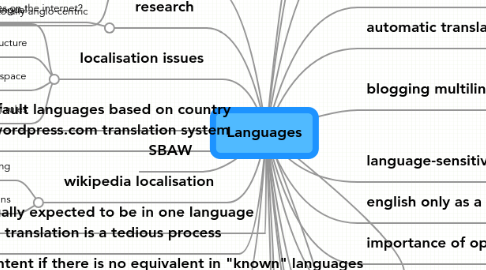Languages
par Stephanie Booth


1. how are we using automated translation?
2. the web
2.1. english
2.1.1. ascii
2.1.2. us-en
2.2. monolingual scientific space to start with
2.3. still totally anglo-centric
3. research
3.1. appearance of other languages on the internet?
4. localisation issues
4.1. still monolingual
4.2. languages don't have the same grammatical structure
4.3. languages don't take up the same space
4.4. languages don't have the same typographical rules
5. default languages based on country
5.1. cf. CH !== de rant
6. wordpress.com translation system
7. SBAW
8. wikipedia localisation
8.1. rewriting
8.2. links to equivalent pages made by humans
9. a web page is usually expected to be in one language
10. translation is a tedious process
11. hiding content in a language that is not "known" can mean depriving the user of valuable content if there is no equivalent in "known" languages
11.1. e.g. I don't consider I "know" italian but I can understand a lot of it
11.2. need for a more subtle way of mapping people's linguistic abilities
12. bridge bloggers and people
13. the most important borders on the internet are linguistic
13.1. in the world too -- it is the thing that most prevents people from communicating
14. hire multilingual editors to offer digests of the foreign-speaking web (did this idea happen?)
14.1. translation
14.2. rewriting
15. bilingual me
16. many people don't live in monolingual spaces
16.1. switzerland
16.2. india
16.3. work
16.4. immigrants
17. many different ways of "knowing" a language
17.1. understanding
17.2. basic communication
17.3. a few words
17.4. full mastery
17.5. mother tongue
18. people "know" english
18.1. too often assumed
18.2. "knowing" does not mean "comfortable with"
19. automatic translation is often more funny than really useful
19.1. can help, though
19.1.1. e.g. post on coComment in japanese
19.1.2. particularly when there is some knowledge of the translated language
20. blogging multilingually: how to embrace one's languages
20.1. translation (equivalent content)
20.2. rewriting
20.2.1. close to original
20.2.2. very distant from original
20.2.2.1. excerpts
20.3. markup for mixed pages
21. language-sensitive services (search etc)
21.1. language recognition
21.2. do they use the lang attribute?
21.3. can they accept more than one language per page?
22. english only as a barrier to adoption
23. importance of opening up to other languages/cultures
23.1. better understanding of those who are "different"
23.2. more tolerance
23.3. better understanding of oneself
24. offline, non-verbal communication is the safety net if you don't share a language with somebody. Online, there are often only words.
25. Non-native speakers come across as rude or stupid
25.1. make mistakes
25.2. miscommunicate
25.3. don't understand
25.4. can't be understood
25.5. aren't as eloquent as native speakers
25.6. there was a blog post about this, can I dig it out?
26. giving this talk in english!!
26.1. who's mother tongue is not english?
27. English is the lingua franca
27.1. a lingua franca is not a bad thing
27.2. globish
27.2.1. can we really hope for a unique link language?
27.2.2. lack of subtlety
27.2.3. business-oriented
27.2.3.1. but the living web isn't just about business
